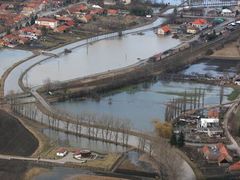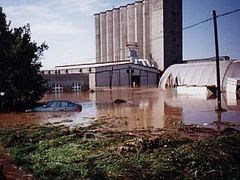Prague - We will not give up our land for cheap - that is what the Czech water authorities hear from people in flood risk areas of the country. Because of this kind of disagreements those areas still lack long planned measures against floods.
The ministry of agriculture believes it found a recipe that would help: confiscation.
Ten years after the devastating floods, several property owners near the river Labe at the village of Dobruška-Melčany still make the water project planners worried. It is their land close to the banks of Labe that should be used for building polders and water reservoirs.
Those will have a capacity to protect larger areas previously hit by flooding. But the owners refuse to sell their lands for the offered prize, some of them request four times more or do not want to sell the property at all.
"They refuse anything we offer saying that it is not good enough," said Václav Jirásek, spokesperson for the Water Authority of Labe. "I think that there are people who would not be satisfied with any offer at all. They simply refuse to give up their land," Jirásek said.
Flood amendment
In the future, the authorities might have a way to deal with those rebellious land owners. A new flood amendment of the Water Act will be voted on by parliament.
If passed, it would enable authorities to confiscate property if necessary. "In this touchy subject of confiscation, members of the parliament are hesitant to vote in favor. Though it is still in harmony with the constitution," said Václav Mencl, a MP for Civic Democrats.
European Union is expected to make 15 billion euro available for anti-flood measures before 2012. Property disputes, however, are a major obstacle.
People in Mělčany are typical candidates for confiscations, Mr. Jirásek said, because they prevent a large area from being protected against floods.
In the interest of the public
It is in public interest to protect this area. The polders planned for this village have been discussed since the devastating flood of 1998 when six people lost their lives and thirty communities were destroyed in the area. The cost of damages reached two billion crowns.
Polders, dry reservoirs by the rivers, became one of the hot topics after the floods ten years ago.
"Polders are very natural, they are not difficult to build. Their only problem is that they affect both residential and commercial property owners," said Daniel Pokorný from the ministry of agriculture.
In Uherské Hradiště in Moravia, about 120 people out of 700 refused to sacrifice their land for the sake of polders that would protect the whole area.
"We had to rethink the whole project. The only thing we were able to do was to build or extend dikes," said David Fína from the Moravian Water Authority.
City council also opposes
It is not only property owners who oppose the construction of polders. The city council in Rájce-Jestřebí refused to have a polder on its ground as well, stating that "it would protect the other communities but not us." The water caught by a polder would be cleaned by the town's systems, it will use the town's sewage system, it will be the town's inhabitants who will pay for it.
The surrounding communities do not want to pay for it at all. People in Rájec-Jestřebí are also worried about mosquitoes and they do not want to give up a park by the river where they go for walks.
"Even if the law about confiscation was passed we would be limited by the decisions of city councils," says Karin Kovářová from the investment department of Moravian Water Authority. "If the law is passed we would fight against the state intervening in our business," the mayor said.
"People should not think that confiscation means losing their property. That would not be possible given our juridicial system," said Jirásek from the Water Authority. If the law is passed, people in Dobruška-Melčany would not lose their land automatically. They will be able to appeal the decision and also file a legal action. As long as the legal procedures will be under way no one will be able to take the property away from its owners.
"That would mean that we would not be able to start with the construction for years. It might happen that when we would finally be able to start building the polders, there would be no more European money and we would not be able to construct the polders at all," said Jirásek. The confiscation might therefore work more as a "moralizing agent". "If people are faced with it they might realize that their demands are not realistic," Jirásek added.

